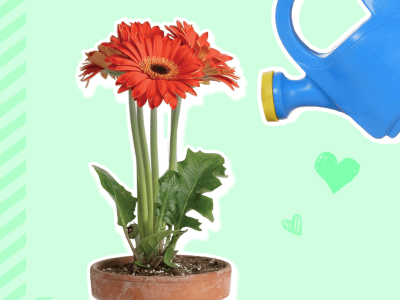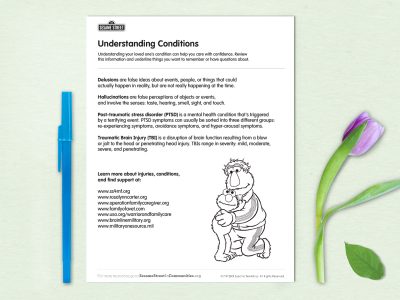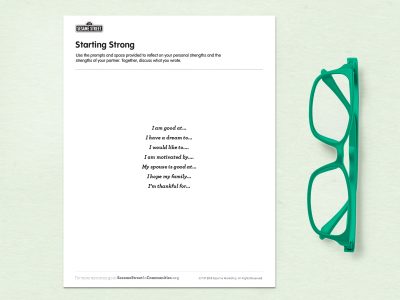
Session 1: Starting Strong
Empower families to start from a place of strength.
We often talk about caregiving as a journey. As a provider, you can help families navigate with confidence.
As a first step, help families understand where they are right now, and what they have to work with.
This workshop:
- Explains common conditions and injuries that military and veteran families face.
- Helps families understand each person’s needs.
- Empowers families to start from a place of strength.
Looking for the rest of the sessions? Visit the Supporting Caregiving Families page.
NOTE: Sections 1 and 3 of this workshop are best suited for grown-ups. During these sections, you might engage kids in separate activities, such as a read-aloud or move-along story paired with a coloring or art activity.
1. Understanding Conditions
Understanding Conditions
Understanding their loved one’s condition can help caregivers care with confidence. Distribute the Understanding Conditions printable (for grown-ups only). Ask participants to review it quietly and underline things they want to remember or have questions about.
Assure participants that they can share safely in this space, and facilitate a discussion. You might ask: What stood out to you? Did anything surprise you? What strategies are you already using to help in your family?
2. Naming Your Needs
Naming Your Needs
Family Garden Activity
You’ll need:
Flower seeds
Potting soil
Cardboard egg cartons
Water
Popsicle sticks
Markers
Instructions:
- Give each family a piece of an egg carton, making sure the number of wells matches the number of people in their family.
- Distribute one seed per person, a small amount of soil, and water.
- Invite families to plant their seeds and create a label for each member of the family using the popsicle sticks and markers.
As families plant their seeds, talk about what a plant needs—soil, sunshine, water, time. Then ask families to consider what people need. Using a whiteboard, chalkboard, or chart paper, write down these basic needs—exercise, adequate sleep, attention, nutrition.
3. Starting Strong
Starting Strong
Injury, illness, and other big changes can affect how we see ourselves, how we connect with others, and how we imagine our future. As a provider, you can help caregivers and their spouses name and be thankful for each others’ strengths—and lay a strong foundation for taking the next step.
Invite participants to watch Parenting After an Injury. As they watch, encourage participants to look for similarities in their own story. What do you admire about the family in the video? What strengths does each member of the family bring? What affirming phrases do you hear?
After watching the video, distribute the Starting Strong worksheets. Ask caregivers and their spouses to reflect on their personal strengths and share them with each other. Then ask if anyone wants to share an insight with the larger group.
Remind participants that:
- They are on this journey together.
- No one has to go it alone.
- Being thankful every day can make a big difference.
- They are strong, individually and together.


